
by jlansber | Nov 13, 2022 | College News

DePaul’s Executive Education programs create competitive advantages for individuals looking to advance their careers and help organizations meet their learning and development goals.
To accelerate both individual and organizational talent development, the Driehaus College of Business launched DePaul Executive Education this fall. Program offerings include:
- Open enrollment, 12-week, noncredit certificate programs for all levels of professionals seeking to upskill or reskill. Programs in business analytics and entrepreneurship will begin this winter and programs in health care management and business administration will launch in spring 2023.
- Customized learning and development programs for organization partners. Powered to accelerate talent development, these programs feature consultative design, development, execution and evaluation by DePaul in collaboration with organization partners.
DePaul Executive Education programs are among new initiatives overseen by the Hay Center for Leadership Development, led by Associate Dean Bob Rubin and founded with a generous estate gift from the late DePaul Trustee William E. Hay (MBA ’66, DHL ’06). In 2023 the center plans to launch a yearlong leadership development program for DePaul undergraduates that will provide scholarships, mentoring and rigorous career preparation.

by jlansber | Nov 13, 2022 | Scholarly Pursuits

A recent study co-authored by DePaul business professor Pavel Savor has found that some banks potentially use alternative ways to pursue political influence.
In 2008, Countrywide Financial, once the largest mortgage lender in the United States, was embroiled in a scandal that caused banks to rethink how they pursue political influence. For several years, Countrywide Financial offered loans with low interest rates and other benefits to members of Congress, congressional officials and directors at the U.S. government-sponsored mortgage financer Fannie Mae. After the Countrywide affair was revealed, banks implemented stricter rules around their dealings with politicians, but a recent study co-authored by a DePaul business professor has found that some banks potentially use alternative ways to pursue influence.
The study examined whether banks offered better loan terms to firms that are connected to members of Congress, focusing on close elections, which the authors defined as those in which the victory margin was less than 5%. Their results showed that political connections ultimately led to lower interest rates on new loans to affected firms.
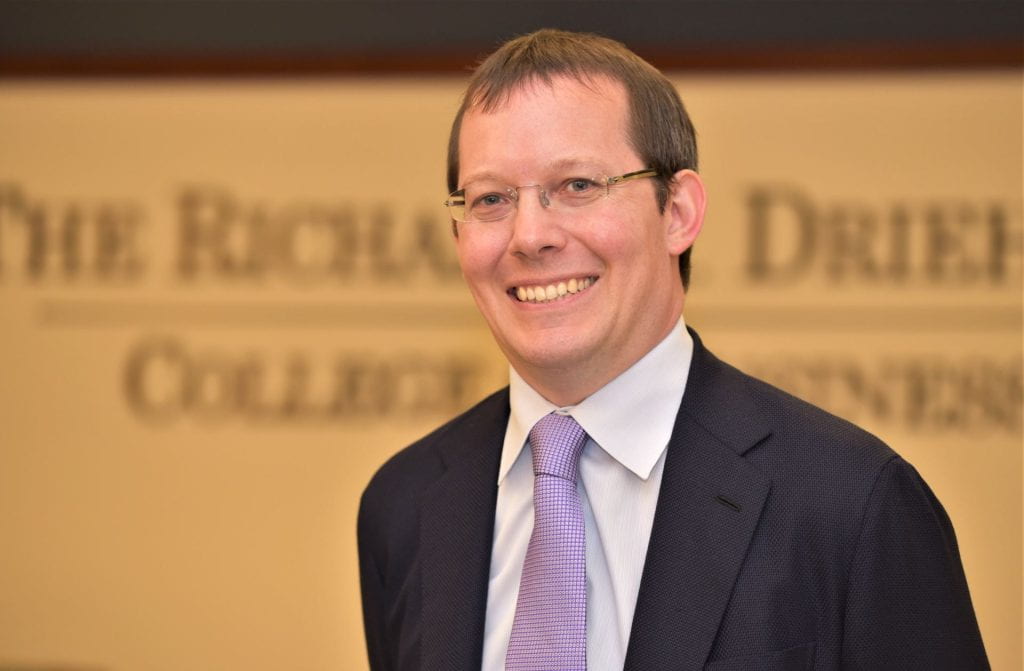
Christopher L. Keeley Chair in Investment Management Pavel Savor
“We were surprised that these banks, at least in our interpretation of the results, tried to ingratiate themselves with politicians by actually giving better loan terms to firms that appear to be supported by these politicians,” says co-author Pavel Savor, a professor of finance and the Christopher L. Keeley Chair in Investment Management at the Driehaus College of Business. “It’s not something I would have guessed when starting this project.”
Savor recently presented the study at several international conferences, where he says he heard from a number of former bank employees who mentioned their employers’ strict rules about dealing with politicians.
“It’s often said that one of the worst things that can happen to a bank is that one of their ex-executives becomes a regulator because that regulator now has to be especially worried about perceived possible conflicts of interest,” he says. “The other thing a bank can do is try to ingratiate itself with politicians by using some less observable means.”
In addition to being treated more favorably by politicians and regulators, firms’ business partners—lenders, customers or suppliers—may also treat banks more favorably as a result of those connections.
“In addition to having direct benefits, these connections may also have indirect benefits, which illustrates the potential importance of political connections and influence on businesses, especially large businesses,” Savor says.
Other findings from the study include:
- Loan terms depend on several factors. The authors found that the improvement in loan terms was much greater when politicians sit on important congressional committees (the effect becomes 244% stronger), when the firm is among the politician’s top campaign contributors (652% stronger impact), and when the firm and politician come from the same state (250% stronger impact).
- Interest rate savings add up. The cost of offering discounts in the form of lower interest rates to connected firms is more than the maximum direct contribution firms can make to a political campaign. The amount of interest rate savings was found to be 10 times higher than what firms can contribute in any given year.
- The 2008 financial crisis may have affected banks’ loan activities. Banks were more likely to offer lower rates and lend more frequently to connected firms if they were facing regulatory issues and during the period surrounding the passage of the Troubled Asset Relief Program (TARP), a program enacted by the U.S. government to help stabilize the economy in the wake of the 2008 recession. The study showed that the impact of political connections was much stronger (625%) during this period, as it also was for banks that received government bailouts.
By Jaclyn Lansbery
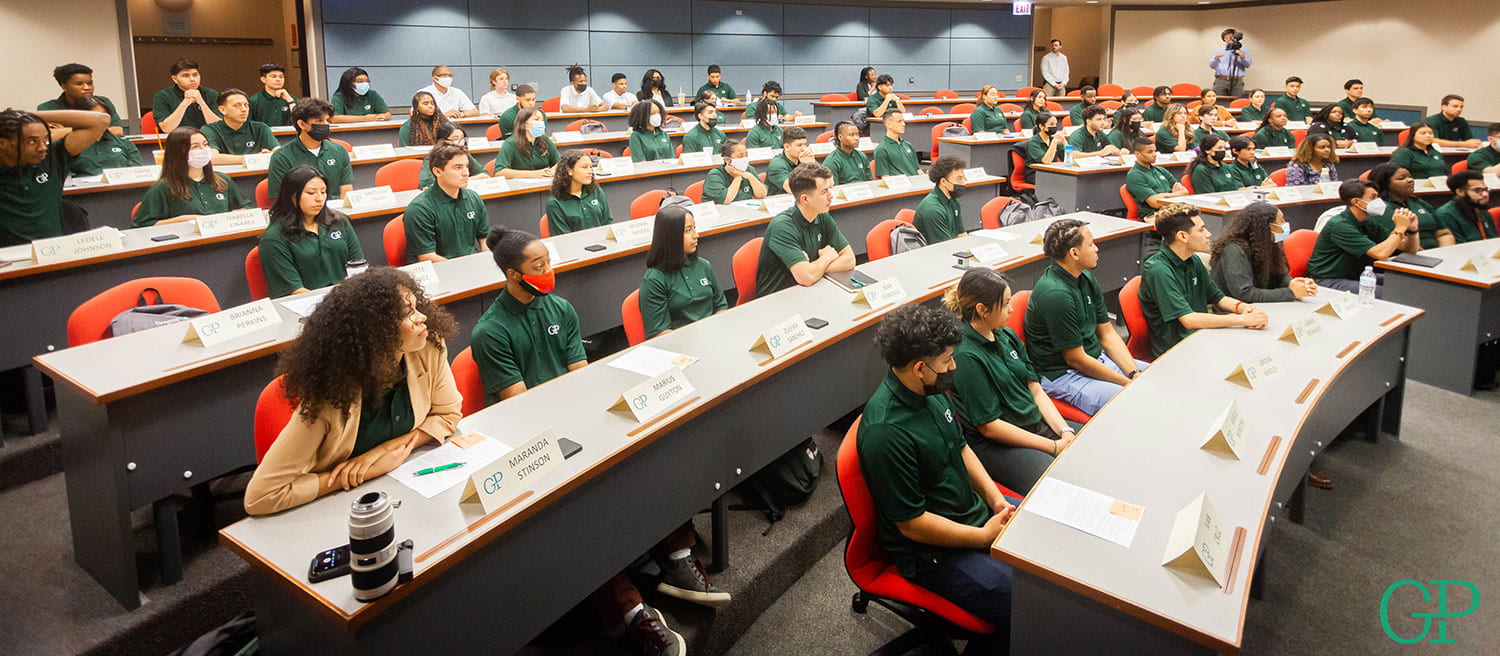
by jlansber | Nov 13, 2022 | Features

DePaul partnered with the nonprofit Greenwood Project to help deliver an in-person financial services summer boot camp to more than 200 Black and Latinx youth. (photo courtesy Greenwood Project).
DePaul collaborates with businesses, non-profits and alumni to empower the career ambitions of underrepresented students
While corporate America has made modest gains in diversifying its leadership, women and people of color remain underrepresented in the executive ranks of many industries.
Women represent a mere 5% of C-suite leaders, according to the McKinsey-LeanIn.Org Women in the Workforce 2022 report, and only 17% of executive roles are held by people of color, the Gartner 2021 Leadership Progression and Diversity Survey found.
“HR leaders cite a lack of diversity in the pipeline as the top challenge to diversifying the leadership bench,” Gartner noted in its report.
The Driehaus College of Business is taking an active role in addressing this challenge, and is in a unique position to spark progress as a business school serving diverse learners in the heart of Chicago’s business community. Inspired by DePaul University’s mission to ensure the success of students from underserved communities, the college is collaborating with businesses, nonprofits and alumni benefactors to help underrepresented students gain a foothold on the path to business leadership.
Examples of these collaborations include:
- A partnership with the nonprofit Greenwood Project to host summer programs at DePaul that introduce students from underrepresented communities to opportunities in the finance industry. Last summer more than 200 Black and Latinx high school and college students, largely from Chicago’s South and West sides, participated in Greenwood programs at the Driehaus College of Business.
- The launch of the Deloitte Foundation Accounting Scholars program at DePaul to fund scholarships for racially and ethnically diverse students seeking graduate accounting degrees, sponsored by Deloitte’s Making Accounting Diverse and Equitable initiative.
- Co-curricular career readiness programming at the Keeley Center Academy, and new student organizations for women and people of color in DePaul’s finance program, supported by finance industry donors.
- New KPMG-funded scholarships and analytics resources for underrepresented students pursuing Master of Science in Audit and Advisory Services degrees at DePaul.
- A summer accounting boot camp supported by a PwC INQuires Grant in 2022 for first-year DePaul students of color.
- Incubator programs to advance the success of DePaul and community women business founders, supported by the Women in Entrepreneurship Institute advisory board and industry sponsors.
- A new, yearlong, rigorous leadership development program for DePaul undergraduates that will start in 2023. The program is overseen by the business college’s Hay Center for Leadership Development, founded with a generous estate gift from alumnus and DePaul Trustee William E. Hay (MBA ’66, DHL ’06).
These initiatives seek to transform the lives of students while addressing one of the college’s priorities—to become an agent for social mobility, says Sulin Ba, dean of the Driehaus College of Business.
“A college education remains the most potent pathway for social mobility, yet disparities remain for students from underrepresented communities,” she says. “Many of our students are the first in their families to attend college, and they may have no industry connections or role models for accessing career opportunities in finance, accounting and other business fields. Our business community collaborations create opportunities for students to acquire mentors, career skills, internships and industry connections that allow them to turn their career ambitions into reality.”
Learn more about the impact of these initiatives through the profiles of three DePaul next-generation business leaders—a freshman, a graduate student and a recent alumna—whose success has been empowered by the Driehaus College of Business and its business community allies.
- Olivia Perez: The Greenwood Project and DePaul opened “a whole new world for me”
- Seerat Kaler: Paying it forward to empower women in finance
By Robin Florzak
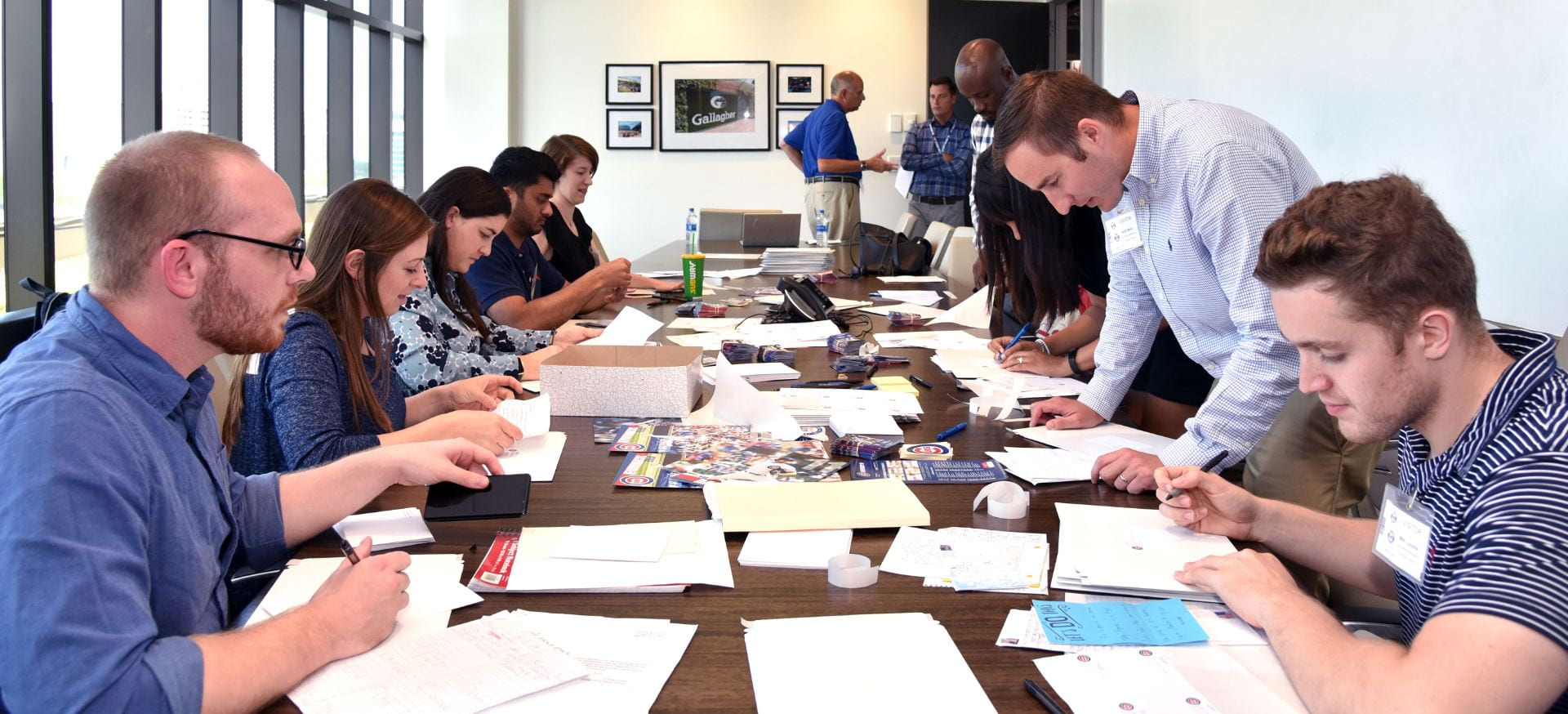
by jlansber | Oct 25, 2021 | Features

Anissa Patterson (seated fifth on the left) and DePaul sports business classmates review fan letters as part of a customer service consulting project for the Chicago Cubs baseball organization. | Photo by Kathy Hillegonds
Anissa Patterson (BUS ’21) took her first sports management class at the Driehaus College of Business three summers ago. At the time, Patterson was earning a business administration degree and unsure of what field she wanted to pursue, but she had always been an avid sports fan. So when she learned about a business class that would allow her to work directly with the Chicago Cubs organization, she signed up immediately.
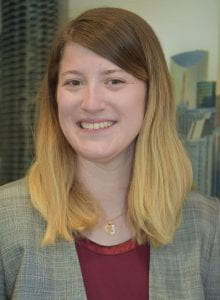
Anissa Patterson (BUS ’21) | Photo by Kathy Hillegonds
During the eight-week class, Patterson gained a firsthand look at what it would mean to work as a consultant who provides expertise for a specific problem. Students in the undergraduate course, taught by Andy Clark, director of DePaul’s sports business program, partnered with the Chicago Cubs Service Excellence Program and became “secret shoppers” who tested the quality of all aspects of the professional baseball team’s customer service. The class showed Patterson not only what it would be like to work in the sports industry, but also how to identify and solve problems for organizations.
“It was really nice to be treated like a professional during my experiential learning classes with Professor Clark,” Patterson says. “It wasn’t just making a presentation in class—you’re presenting to real execs who work in the industry. That was a great experience to have and to put on a résumé, and it helped me get a job.”
Today, Patterson works as the client services coordinator in partnerships for the Chicago Wolves, a professional ice hockey team playing in the American Hockey League. She credits her classes not only for helping her gain marketable skills and experience but also for helping her learn how to communicate with multiple stakeholders who have different perspectives, a skill that consultants must utilize when taking on projects.
“When you are consulting with someone,” she says, “you have to make sure you’re communicating on a level that everyone understands.”
Growing Demand for Consulting Skills
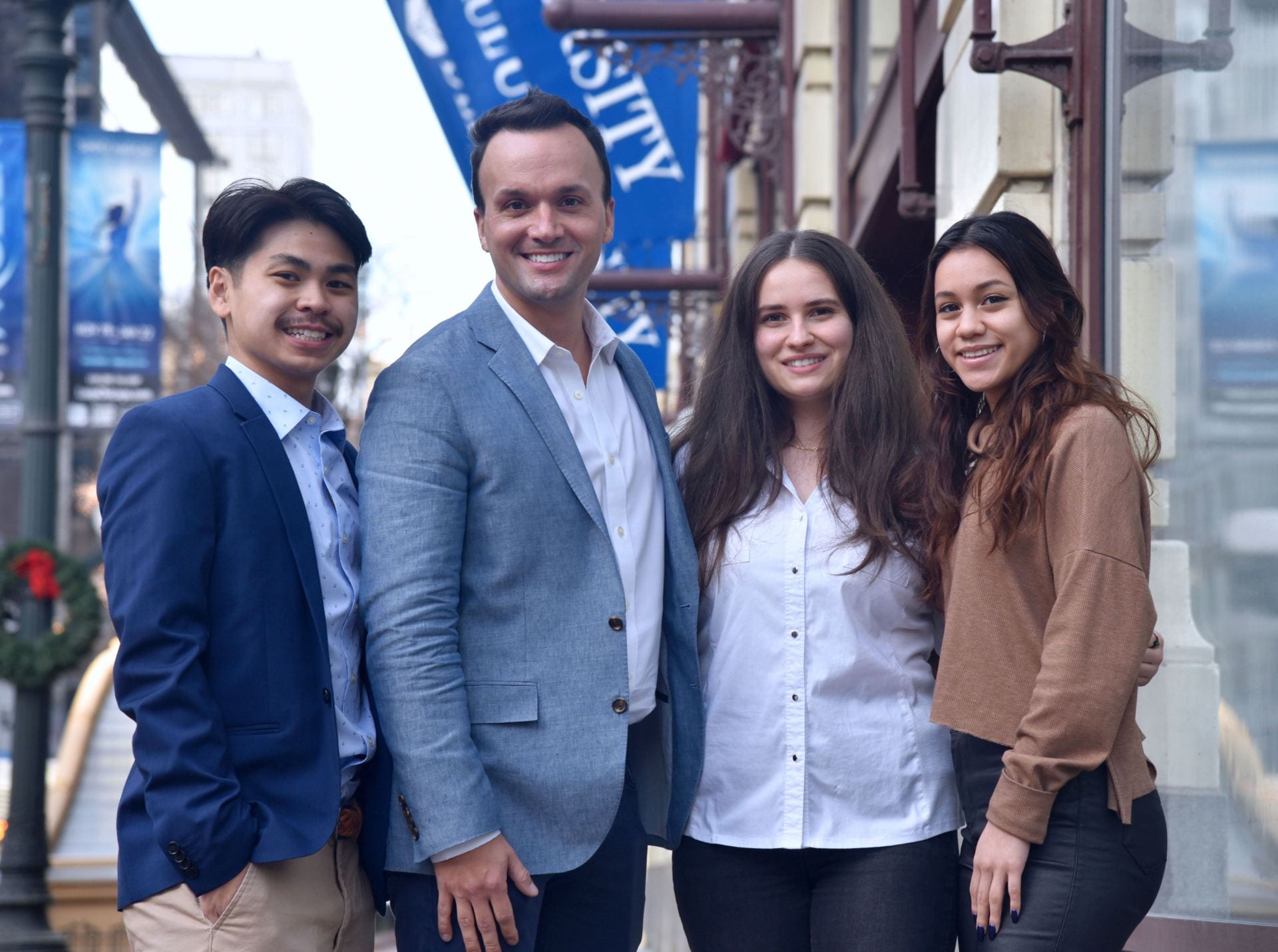
Marketing Consulting Club faculty advisor James Mourey (second from left) with student members Timothy Tran, Julia Adams and Faith Ramos. | Photo by Kathy Hillegonds
Since 2012, the number of management consultants working in the United States has continued to increase every year. According to Statista, which specializes in market and consumer data, 734,000 consultants worked in the U.S. in 2020. Although consultants can provide a range of expertise, graduates with business degrees offer a blend of teamwork skills and business acumen that employers often seek. According to a Graduate Management Admission Council survey, 95% of consulting sector recruiters said they expected to hire MBA graduates in 2021.
Given this demand, the Driehaus College of Business is actively preparing students to enter the workforce poised for consulting careers or to use consulting skills to increase their success within organizations. A recent college survey found that 76% of the faculty incorporate consulting, case studies and other real-world projects into classwork.
Associate Professor of Marketing James Mourey serves as faculty advisor of the student DePaul Marketing Consulting Club, which has taken on consulting projects for companies ranging from alumni-owned startups to national companies, such as Philz Coffee. He also teaches a marketing capstone course that challenges student teams to propose solutions to organizational problems outlined in business cases for well-known companies and brands.
Exposure to real-world client work through classroom and student organizations “transitions our students from passive students to active, prepared practitioners of our discipline,” Mourey says.
Mourey, who worked as a consultant in Los Angeles before completing his doctorate, says he believes business students bring a different, holistic perspective as a function of their education and training.
“Importantly, though, having experience lends credibility that is important for consultants,” he says. “Formal education is one thing, but getting your hands dirty in your discipline exposes you to myriad issues, challenges and problems people in your field face, as well as potential solutions that work or don’t work, all of which makes you an informed resource in a consulting role.”
Solving Human Resources Challenges

Rachel Collins (MBA ’21) worked on a student consulting project for United Airlines’ human resources division.
For Rachel Collins (MBA ’21), gaining hands-on experience meant learning more about the human resources industry through a consulting lens. For several years Collins worked in a variety of events and sales roles and eventually found her passion for working with people in human resources. She came to DePaul after hearing about the human resources graduate program and decided to pursue an MBA.
To gain more real-world experience, Collins decided to enroll in a consulting skills course, taught by Associate Professor Jaclyn Jensen, which allows students to work on quarter-long projects with real clients. In winter 2021, Collins worked with four other students to help United Airlines develop a hiring and retention framework for the Chicago-based airline’s human resources division. Collins worked closely with United Airlines HR professionals to identify their needs and then interviewed several of the organization’s employees. At the end of the class, Collins and her team presented their findings to United Airlines’ chief learning officer.
The project, although challenging at times, helped her become more comfortable with leading interviews and problem-solving. “Sometimes in consulting, the company you’re helping thinks they know what the issue is but in reality there may be a lot of underlying issues,” says Collins, who now works in talent acquisition for a Chicago-based trading firm. “I think that kind of came up in this project, and that was a big challenge for us. It made us learn to be flexible and be willing to [initially] fail. But sometimes that’s okay because it means you’re getting closer and closer to the end result.”
Consulting Expertise “A Big Differentiator”

A class project inspired Matt Almeranti (BUS ’18), now a LinkedIn regional account manager, to become a sales professional. | Photo by Mike Nowak
As a graduate of DePaul’s Sales Leadership Program, Matt Almeranti (BUS ’18) had an opportunity to utilize consulting skills early in his career. Almeranti credits his experience in an analytical sales course for preparing him for his current role as regional account manager for global clients at LinkedIn.
The undergraduate course challenged students to address a business case scenario in which they were consultants tasked with persuading 3M corporation to buy Salesforce software. While the case was hypothetical, the students had to make a presentation to actual Salesforce employees who came to their class. Almeranti says his experience with the class was “singlehandedly the biggest differentiator I had coming out of college,” igniting his passion for sales and teaching him to apply consulting skills in his career.
Although his current role at LinkedIn is in sales, Almeranti says it’s important to be seen as a collaborator with expertise that clients can rely on. “When you are working at a company like LinkedIn where you’re so strongly positioned in the market, coming off as a consultant and a trusted advisor and a problem-solver is much, much more impactful than someone who is trying to jam product down someone’s throat the entire time,” he says.
As a consultant, “if you build trust, you can earn responsibility and really scale your career, whether that be for internal projects or externally with customers,” he says.
By Jaclyn Lansbery

by jlansber | May 10, 2021 | Features

The pandemic has accelerated the trend of remote and hybrid work and has created a values shift among employees in terms of what they want and need from an employer.
The COVID-19 pandemic fundamentally shifted traditional views of how and where we work, forging a new path toward increased remote and hybrid working environments. New challenges and opportunities are presenting themselves as organizations and their people adjust to changing workplace norms, with some teams staying fully or partially remote and others re-imagining what it means to work on-site at an office. Regardless of industry, DePaul alumni and faculty experts agree that one size does not fit all when it comes to determining the best way forward.
Remote work—a trend accelerated
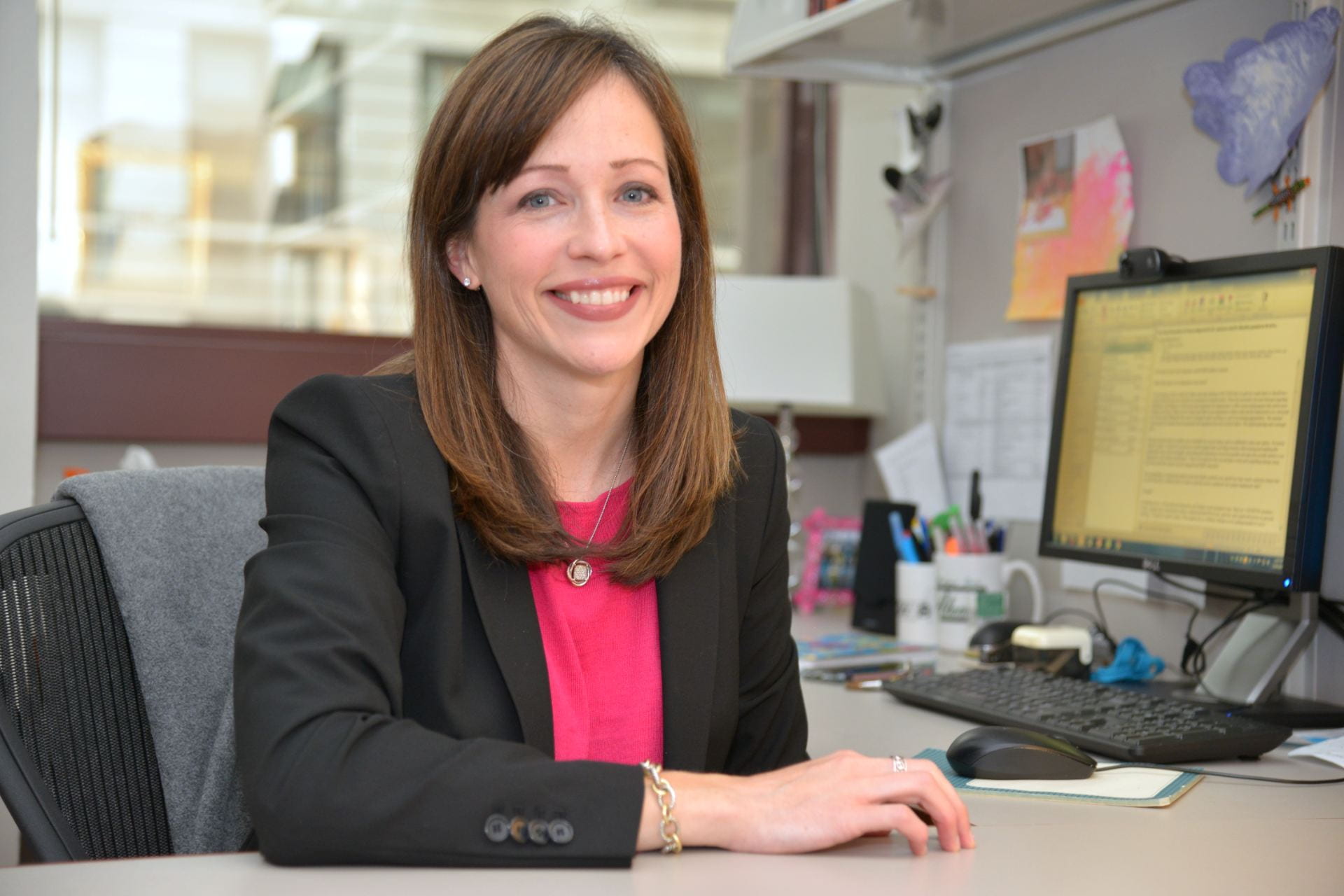
Jaclyn Jensen, associate dean for student success at the Driehaus College of Business, says employees are looking for more flexibility and autonomy from their workplaces. | Photo by Kathy Hillegonds
“A significant percentage of people worldwide worked remotely pre-pandemic, so the idea of having a portion of your workforce remote is not a new concept,” explains Jaclyn Jensen, associate dean for student success, who teaches in DePaul’s human resource programs, including a new Executive Master of Science in Human Resource Management. “What has happened is that a much broader swath of employees has experienced the opportunity, so for them and for their managers, it is new.”
The pandemic has accelerated the trend of remote work and has created a values shift among employees in terms of what they want and need from an employer.
“We’ve been seeing significant turnover in the job market as people are seeking more flexibility and autonomy,” Jensen says. “Employees want to feel valued by their employer as a whole person and not feel like a faceless, nameless contributor lumped into a group. Organizations have to think about how to stay competitive in order to retain and attract talent.”
A new dynamic in the manager-employee relationship has also emerged as the pandemic forced organizations to let go of certain aspects of control over their workforce. Trust, autonomy and accountability have come to the forefront. “If communication was important before, it is even more pivotal now,” says Jensen, who advises managers and employees who are staying fully or partially remote to find innovative ways to create regular touchpoints, set boundaries and expectations, and establish a clear sense of goals and accountability.
“There are strategies to help teams build connections and a sense of trust, comradery and collaboration that can still be implemented in a remote or hybrid work situation,” Jensen says. “It just requires organizations to take a step back, think about lessons learned from working remotely through a pandemic and consider feedback from key stakeholders. They should also consider the nature of the work that needs to get done and allow teams to make the right choices for themselves.”
Employee engagement in the virtual/hybrid workplace
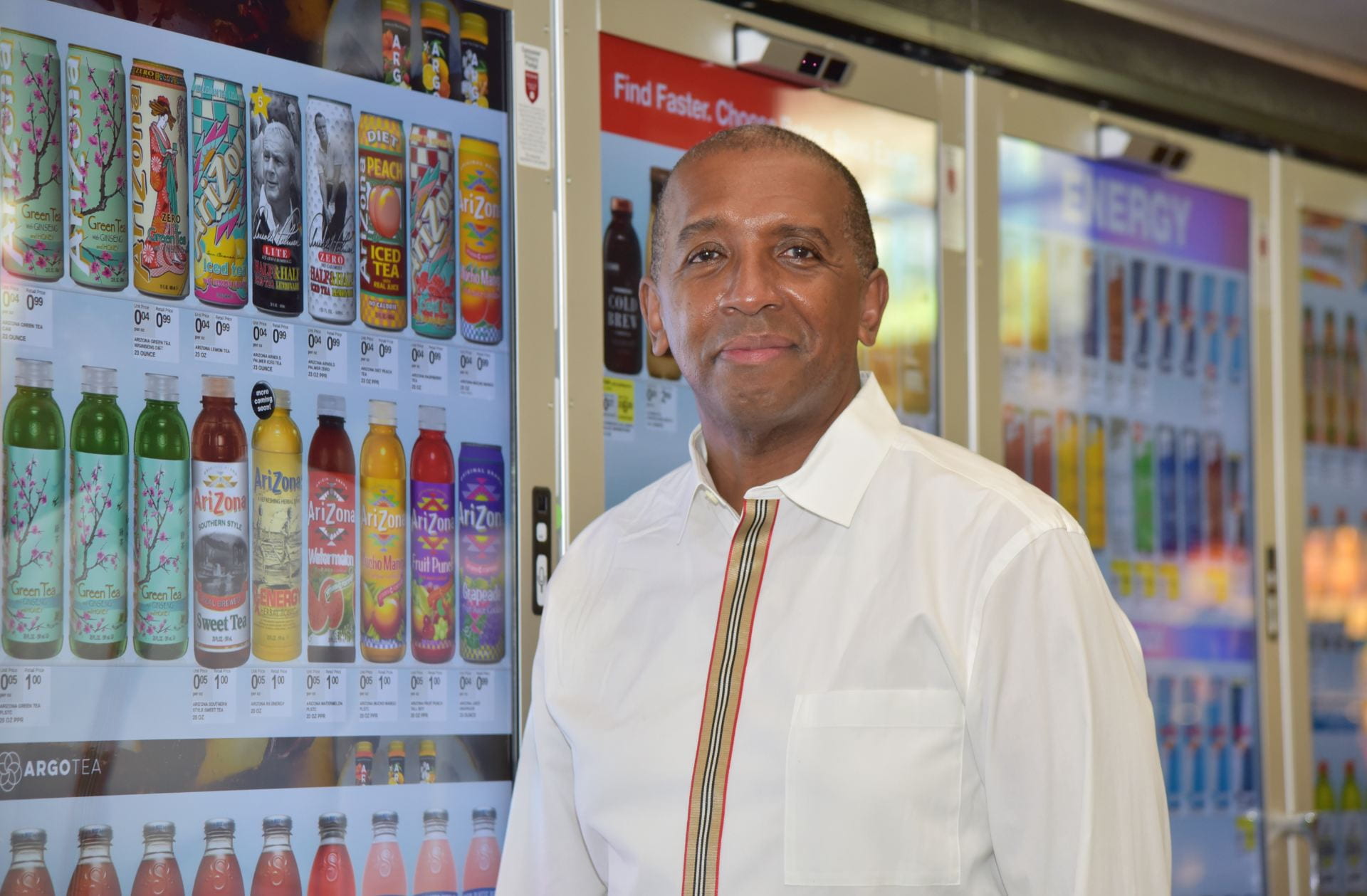
Mark Wattley (LAS ’88), chief people officer for Cooler Screens, recommends that organizations with virtual work environments create opportunities for employees to have nonbusiness conversations. | Photo by Kathy Hillegonds
Expectations around getting work done have become far more important than where people are physically located. Employees are more open to the possibilities when considering an employer, and organizations are moving away from an era where recruiting and hiring were based solely on geographical location.
Early-phase tech company Cooler Screens doubled its workforce in 2021, hiring mostly remote employees after realizing the company could access a larger talent pool while working virtually throughout the pandemic. Headquartered in Chicago, the company has created new ways to onboard and engage its employees, almost half of whom are now located out of state (in 2019, only six out of the then small team of about 25 worked remotely). Team engagement and collaboration become more complex when a workforce is dispersed.
“We had an open concept floor plan with no private offices where everyone, including the CEO and senior leadership, was on the same floor,” shares Chief People Officer Mark Wattley (LAS ’88). “It had a real buzz about it, and that’s hard to replicate remotely. We’ve had to think differently about how we are getting the work done, but also, just as importantly, about how we are communicating and connecting.”
According to Wattley, creating time and space to have nonbusiness conversations is crucial for team rapport, bonding and engagement, especially in a remote or partially remote work environment. “We spend the first few minutes of our weekly team meetings chatting about photographs that we ask people to send that represent what they did over the weekend,” he shares, as an example. “It encourages those nonwork conversations and sidebars that can be a missed opportunity when you don’t see your co-workers on a daily basis.”
Cooler Screens officially reopened its Chicago office in the fall. However, with an increased emphasis on flexibility, the focus has been on using the office for collaboration, some meetings and socializing and as an option for individual work. And with a large workforce now outside of Chicago, the company plans to implement a framework for in-person meetings and events throughout the year to bring everyone in the company together to collaborate and connect.
“We have an extraordinary opportunity in HR to reshape how we work and how people think about work,” Wattley says. “The in-person component is still important, but in this new age, we need to think strategically about what it means to be in an office or not in an office. In my 30-year career, I can’t recall another opportunity like this for management and employees to have these conversations, and I think we should not waste it.”
Rediscovering the value of the office workspace
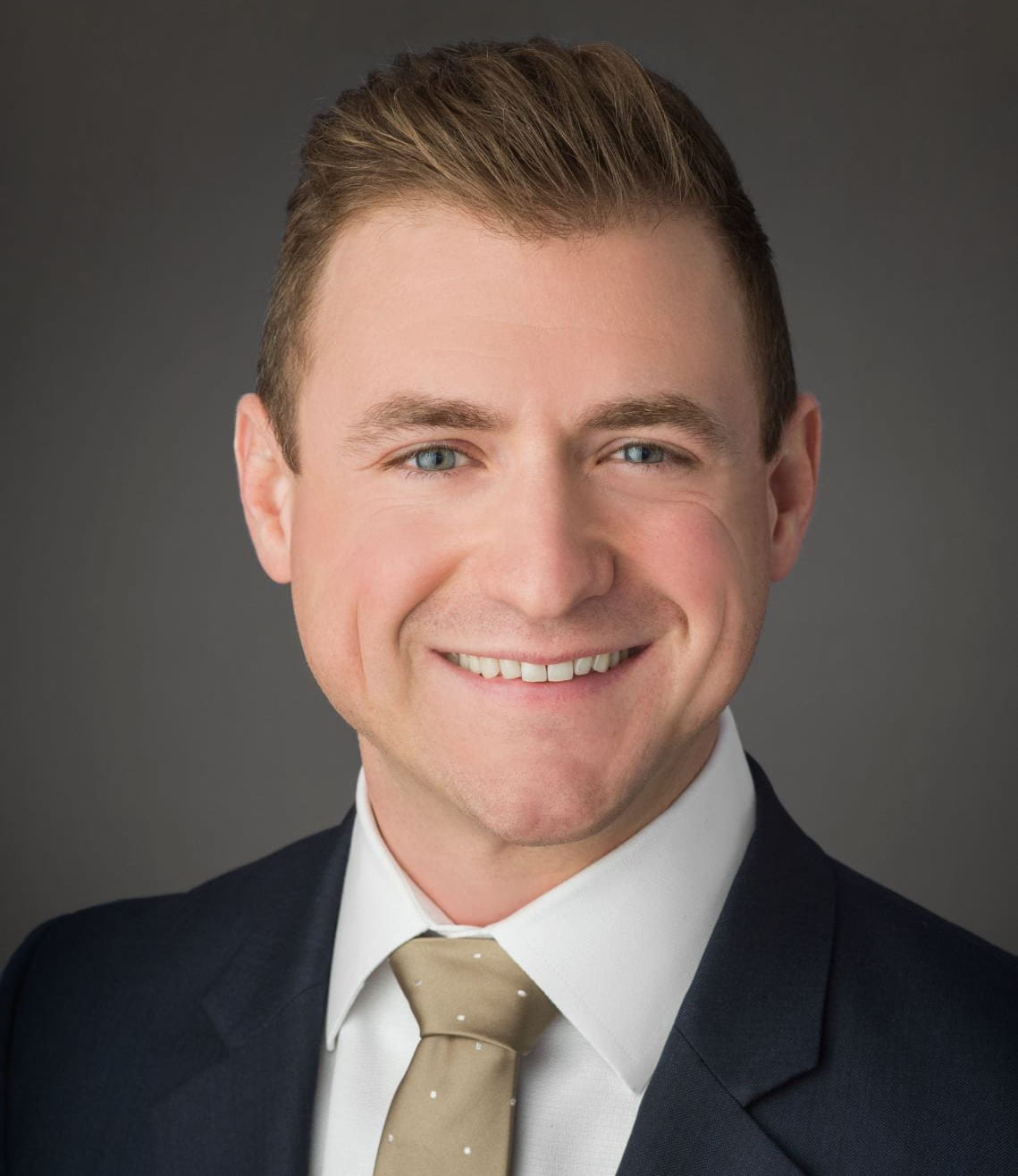
CBRE Tenant Representative Justin Hucek
Reimagining office workspaces to increase employee engagement and productivity among workers is another rising trend. Justin Hucek (BUS ’09, MBA ’18) is an office tenant representative at CBRE who helps companies find workspaces in downtown Chicago and around the country. The office real estate market took a hit during the pandemic, but Hucek says it’s starting to pick up again, albeit with different needs.
“One of the major things we’re seeing is companies trying to create an environment that feels safe and welcoming, but also, frankly, a really cool space to come back to,” he says. “There’s been a mindset shift in trying to use office spaces as a way to attract people back.”
The successful companies, Hucek says, are the ones rethinking and revamping their offices to create more modern, collaborative working spaces of the future. “How can we utilize this space to create engagement, collaboration and inspiration in a way that can’t be done when you’re at home working alone?” is a question many are seeking to address. There has also been an increase in satellite offices popping up around the country as more companies are hiring remotely and wanting to provide a space for those employees. So, while office spaces aren’t going anywhere, the way they’ll be leveraged will likely look different.
One of the major things we’re seeing is companies trying to create an environment that feels safe and welcoming.”
– Justin Hucek (BUS ’09, MBA ’18)
“One thing that will drive how companies decide on their hybrid models is what their industry peers are doing,” Hucek says. “Keeping an eye on that will be important for attracting and retaining talent. If you’re a large firm asking your employees to come back five days a week, and your competitor offers flex days twice per week, you may run into a problem.”
The future of work—tips for success
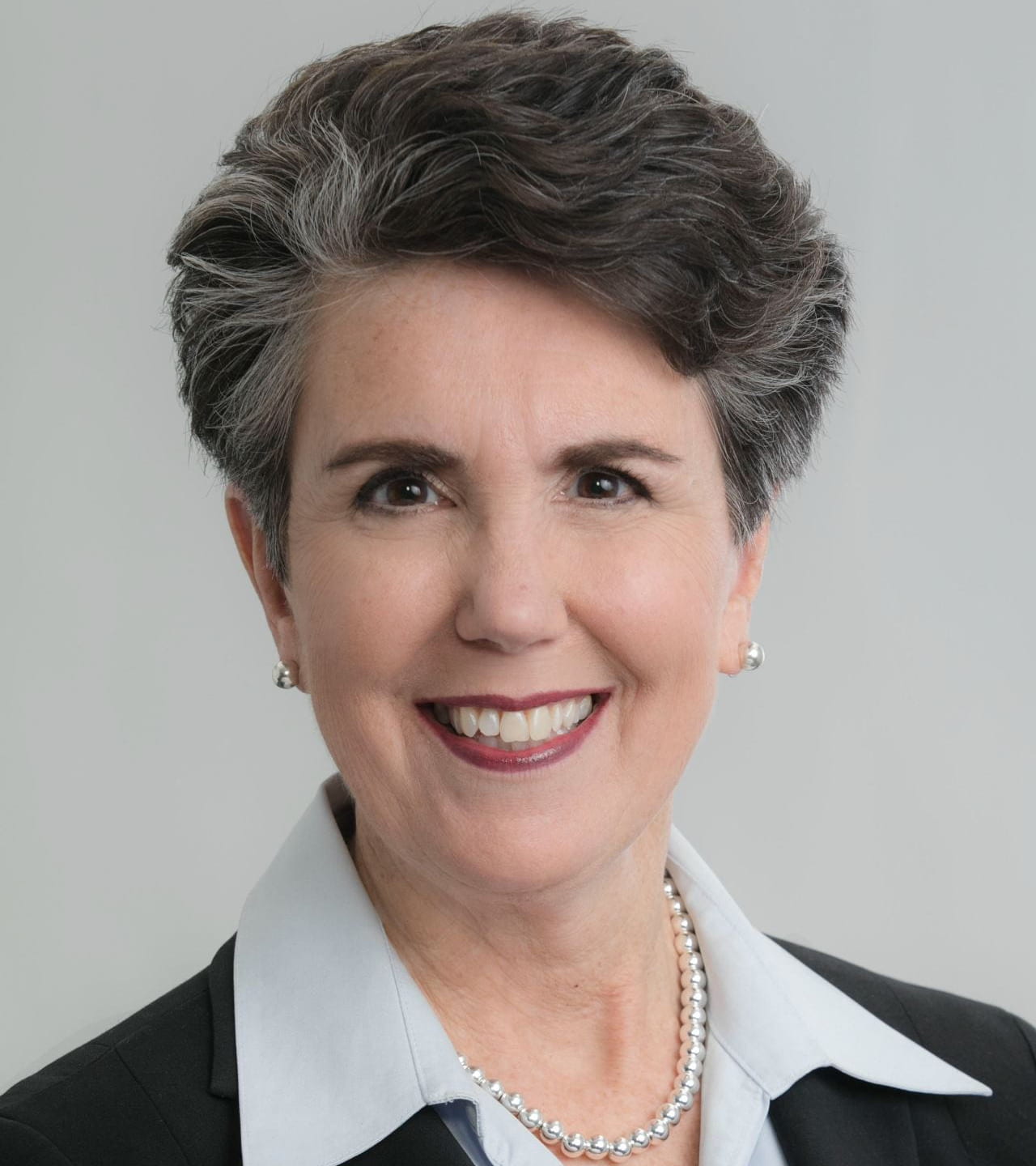
Leslie Lemenager (MBA ’89) consults with companies on strengthening employer-employee relations.
“Pre-pandemic, most leaders would have said ‘people are our most important asset,’ but I feel there was a bit of lip service paid to that,” says Leslie Lemenager (MBA ’89), president of Gallagher’s International Benefits & HR Consulting division. “But now I think employers truly believe that people really are important. Whether you’re an educational institution or manufacturer, you need people in order to achieve your goals.”
Lemenager works with companies to help strengthen employer-employee relationships. She has these tips for organizations to navigate the new workplace:
- Know your core mission and values. When you understand who you are and what you do, it becomes easier to achieve your goals in an evolving hybrid/remote workplace. Organizations with this strong foundation adapt more quickly and are better able to make decisions that blend an employee’s needs with the business goals and objectives.
- Be consistent with your messaging. Communicating your plan to employees will be a challenge. Overcoming the challenge starts with leaders believing in and sharing a unified plan. The more effectively you can communicate and model your vision, the easier it will be to get others on board. Strong messaging also will help managers gain trust and autonomy for making decisions on a local basis.
- Identify the external factors and barriers beyond your control. Make sure you understand your decision-making framework. Know your technology constraints, your budget limitations and your industry’s HR policies and practices that may make change difficult or unattainable.
- Support the manager-employee relationship. Equip managers and employees with the tools, training and professional development they need to be successful in their new working environments. Many managers will need assistance with managing performance and supervising remote team members.
Employees, Lemenager says, need to be more proactive in engaging with their managers and peers, as well as take more ownership of their professional development. “How you get noticed by the higher-ups, get added to the groups or projects you want and build your network is going to look different,” she says. “It can be easy to just focus on your work and not pay attention to opportunities that can aid your career progression if you’re not surrounded by work every day in the traditional sense.”
By Nadia Alfadel Coloma














